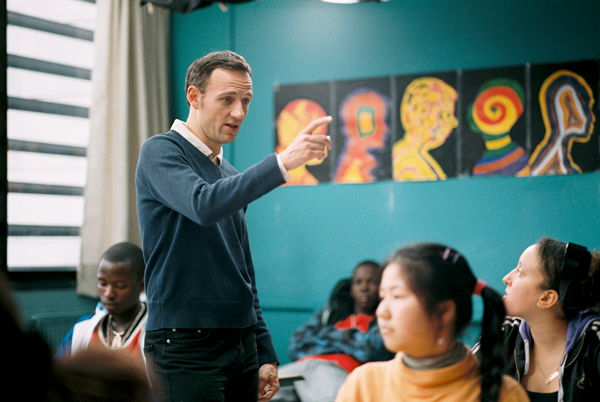|
Reviews of Recent Independent, Foreign, & Documentary Films in Theaters and DVD/Home Video

THE CLASS
The Class’s microscopic scrutiny of an emerging and tentatively multicultural France will likely hit a nerve or two on its home turf. The response here in the states will not be quite the same. It’s not exactly old hat, but a film set in a public school that holds a mirror to changing demographics or the failings of an educational system is already an American genre. What will rouse empathy and exasperation, though, is one teacher’s attempt to act more like a colleague or mentor than an intimidating white male authority figure—a teacher a student can call un ami. Former teacher François Bégaudeau based his bestselling 2006 memoir, Entre les murs (Between the Walls), on his experiences as a French instructor in a Parisian middle school, and director Laurent Cantet doesn’t so much adapt the book as he has Bégaudeau relive his experiences as a French teacher, flaws and all. From the very first day of the school year, François Marin (Bégaudeau) has only tentative command of one class, in particular, where he bends over backwards to treat each student as more like a friend. But it’s not lost on the teens that no matter how approachable he may be, Marin will always have the power to pass or fail them. (By downplaying his authority, he inadvertently patronizes the teens.) One of his assignments is for the students to write an essay about themselves. He may see the assignment as an opening into their lives, but the students interpret his personal approach as a further leveling of the playing field. These kids aren’t rebelling, they’re grabbing power. Disruptions, back talk, and digressions are the order of the day. The loose interactions between Marin and his loquacious class careen in every direction, and the most unruly students hog the screen. However, Cantet brilliantly makes clear that those who are quiet, well-behaved, average, or even exceptional, are left behind in this sort of environment. The cast was culled from the students and teachers from the working-class and immigrant neighborhoods of the 20th arrondissement, and Cantet prepared the nonprofessionals through months-long workshops. (The students’ real-life parents play their onscreen counterparts.) All the scenes had an outline, but the teens never held a script. Taking a vérité/fly-on-the-wall approach, the director’s three lightweight HD cameras gave the ensemble freedom of movement. The interactions feel deceptively undisciplined, and the in-your-face cameras credibly capture classroom claustrophobia. Cantet has pointed out in an interview that the teens were not playing themselves. (One can’t help but wonder where François Bégaudeau draws the line.) Regardless how close to the bone the roles may have been for the young cast, Cantet’s scenario makes demands on all of them that they more than meet—proof that spontaneity takes work. Though formless on the surface, there is one overarching storyline, which leads to a showdown between Marin and practically the entire class. When his students turn on Marin, the director’s blocking of his actors becomes less fluid and a little bit clumsy. For a confidential stairwell conversation between Marin and a concerned teacher (rumor has it that he has used inappropriate language in class), Cantet places the adults in front of a window for dozens of students to see. And Cantet forcibly feeds Marin to the lions in an unlikely confrontation between the harangued teacher and his class, where the students literally but awkwardly gang up on him in the schoolyard. (This is the rare scene where the cast doesn’t seem to know what to do.) But this is
not to undercut how subtly Cantet draws you into the school’s dramas.
Many other films with a strong and unpolished sense of realism—and with
shaky, handheld takes—have won acclaim but failed to be recognized for
the Oscars—famously, Four Months, Three Weeks and Two Days last
year, and any by Jean-Pierre and Luc Dardennes. The Class,
however, has achieved something of a triumph, winning a
nomination for best foreign-language film. With its talky and diffused
storyline, this is a break from the recent past.
Kent Turner
|

